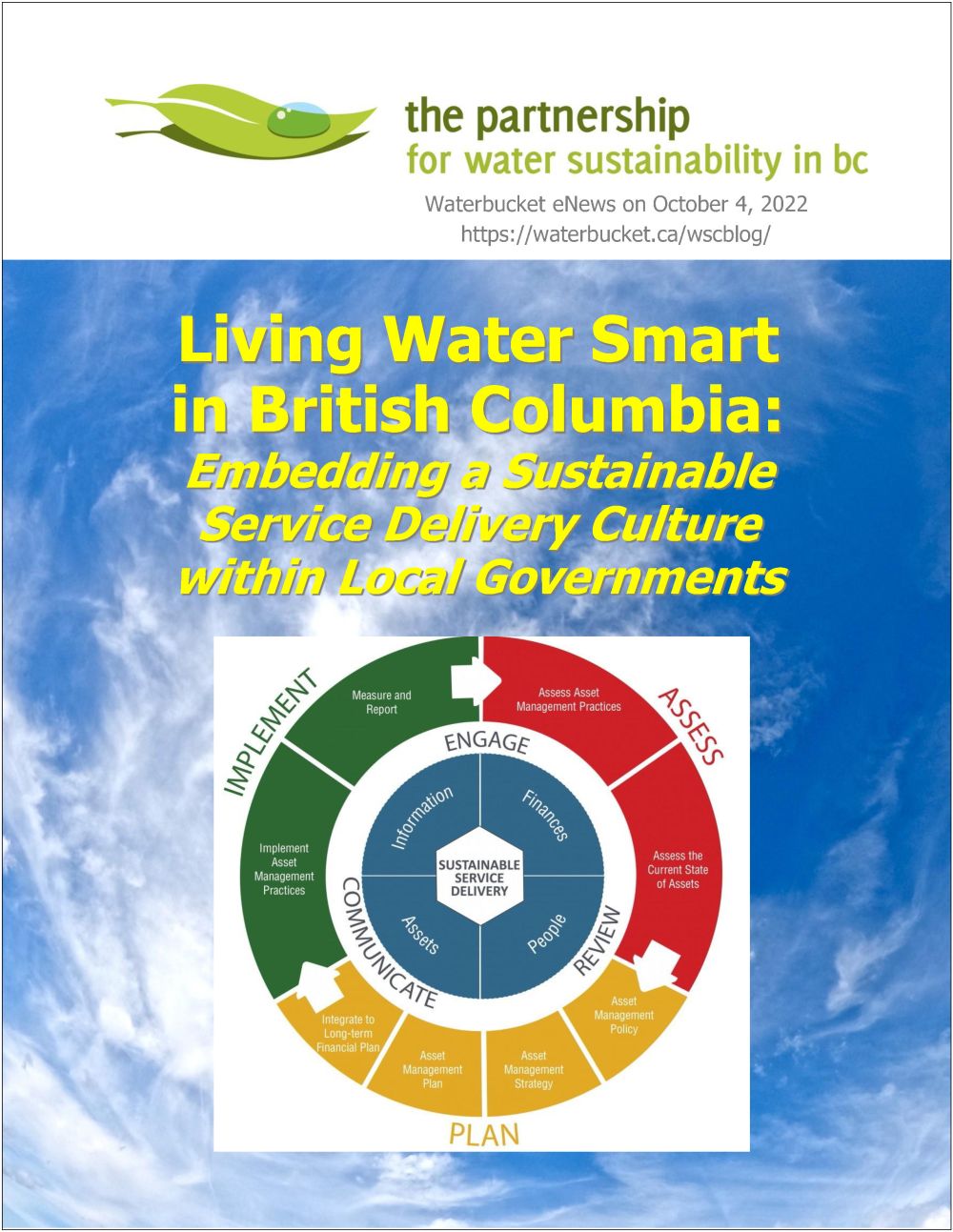ACCOUNTANTS DO NOT KNOW HOW TO ACCOUNT FOR NATURAL ASSETS: “The risk with the accounting profession is that they would include natural assets in local government financial statements in a way that is neither meaningful nor helpful,” believes Wally Wells, well-known to BC local governments as an Asset Management Master, Mentor and Coach
Note to Reader:
Waterbucket eNews celebrates the leadership of individuals and organizations who are guided by the Living Water Smart in British Columbia: The Series vision. The edition published on October 4, 2022, featured a conversation between Wally Wells and David Allen. They are the outgoing and incoming Executive Directors, respectively, of Asset Management BC.

Accountants do not know how to account for natural assets
The news from Asset Management BC is that Wally Wells has passed the Executive Director baton to David Allen to continue the “sustainable service delivery” mission. This duo will continue their collaboration for the foreseeable future as Asset Management BC builds on the foundation now in place after a decade of hard work and a team effort.
The Partnership for Water Sustainability and Asset Management BC share common interests and are jointly operationalizing lynchpin action items identified in Living Water Smart in British Columbia. Although a Memorandum of Understanding is the springboard for ongoing collaboration, our shared commitment to building a resilient future transcends an MOU.
The passing of the baton from Wally Wells to David Allen is the reason that the Partnership released a document titled Embedding a Sustainable Service Delivery Culture within Local Governments. This is another in our “story behind the story” series. It features Wally and David in conversation. They are “agents of change” in the realm of local government.
David Allen and Wally Wells are candid in sharing their reflections on emerging themes that underpin their call to action. “You need free-flowing conversations to be able to reflect and push the boundaries of your comfort zone. That is when you find inspiration,” stated David. The theme for their reflections is Look Back to See Ahead: What have we learned?
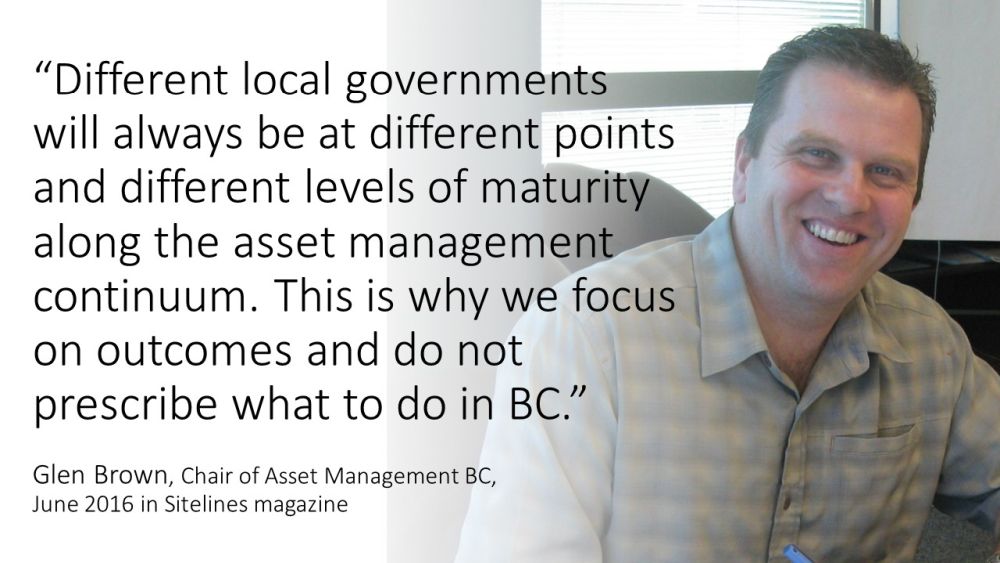
Takeaway Message: Focus on Outcomes
Released in December 2014, and updated in 2019, Asset Management for Sustainable Service Delivery: A BC Framework has redefined the context for deciding how infrastructure is planned, financed, implemented, and maintained in British Columbia. It raises questions about how communities would service urbanizing and redeveloping areas in future.
The BC Framework points the way to a holistic and integrated approach to asset management. Nature, and the ecosystem services that it provides, are viewed as a fundamental and integral part of a community’s infrastructure system.
Passing the Baton:
Wally Wells and David Allen are motivated by their shared desire to inspire implementation of organization-wide asset management. They view this outcome as a foundational element of local government in British Columbia.
“David is the retired Chief Administrative Officer of the City of Courtenay and the Past Co-Chair of the Asset Management BC Community of Practice. His significant municipal experience includes prior positions at 4 other BC local governments,” stated Glen Brown when he announced the passing of the baton from Wally Wells to David Allen.
Glen is the founding Chair of Asset Management BC and General Manager of Victoria Operations with the Union of BC Municipalities (UBCM). He coined the term “sustainable service delivery” in 2010.
“Wally will continue to provide assistance and guidance within our asset management community by continuing his involvement with AMBC as an Asset Management Master, Mentor and Coach,” added AMBC Co-Chair Brian Bedford, an Executive Director with the Ministry of Municipal Affairs.
In addition to their leadership roles within government and Asset Management BC, Glen Brown and Brian Bedford are also members of the Partnership Leadership Team.
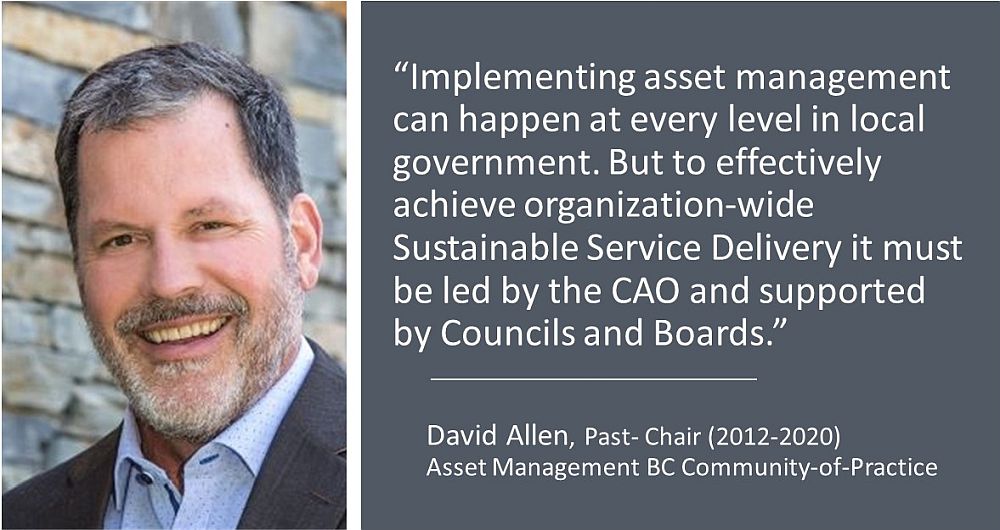
EDITOR’S PERSPECTIVE / CONTEXT FOR BUSY READER
“My experience in conducting conversational interviews is that you let people free-flow and the stories write themselves. And that is what happened when I facilitated a conversation between Wally Wells and David Allen about their passion for Asset Management for Sustainable Service Delivery,” stated Kim Stephens, Waterbucket eNews Editor and Partnership Executive Director.
“With the passing of the baton from Wally to David, having a facilitated conversation provided each with a timely “moment for reflection” on where Asset Management BC has come from and where it is going. They fed off each other’s insights. Themes emerged. All I had to do was listen actively and interject occasionally.”
“David and Wally were so enthused as they reflected on challenges and opportunities associated with embedding a Sustainable Service Delivery culture within local governments. By looking back to see ahead, they identified key themes and issues that provide a road map for moving forward.”
“My challenge was, how do I structure the transcript in order to capture their passion and present key themes in a way that will engage the reader? To those who do take the time to download and read the document, what did you learn? How has that influenced your thinking? What might you do differently as a result?”

Towards Sustainable Service Delivery: Elements of a framework for action by local governments
“By sharing their experience and wisdom in Embedding a Sustainable Service Delivery Culture within Local Governments, David Allen and Wally Wells provide local governments with a road map for a cultural change,” continued Kim Stephens. “They identify four themes that constitute elements of a framework for action:
- Theme #1 – Asset management leadership starts with the Chief Administrative Officer (CAO)
- Theme #2 – Asset management is a process; you cannot legislate a process.
- Theme #3 – Be wary of including natural assets in Public Sector Accounting Board requirements.
- Theme #4 – Asset management is a pathway to Water Reconciliation with First Nations.”
“Wally Wells and David Allen are passionate about all four themes. But they expressed the most passion when they shared their worries about Theme #3. They view it as a ‘clear and present concern’. Their call to action is reflected in the Wally Wells headline quote for this story:
The risk with the accounting profession is that they would include natural assets in local government financial statements in a way that is neither meaningful nor helpful.”
“Because, as both caution: If you put forward a solution in the absence of an understanding of the problem, an unintended consequence may be that you then create an additional problem.”

STORY BEHIND THE STORY: Reflections on embedding a Sustainable Service Delivery Culture within local governments
Extracts from a facilitated conversation with Wally Wells and David Allen about “passing the baton” are presented next. The complete transcript is included as an appendix in Embedding a Sustainable Service Delivery Culture within Local Governments.
Context
Section 7 of the Community Charter defines the roles and responsibilities of local government in terms of “care of infrastructure and services”. In other words, Sustainable Service Delivery.
The anecdotal evidence suggests, however, that at best 40% of local government Chief Administrative Officers (CAOs) accept responsibility for Sustainable Service Delivery as a foundational element of local government. So, what about the other 60% or more?
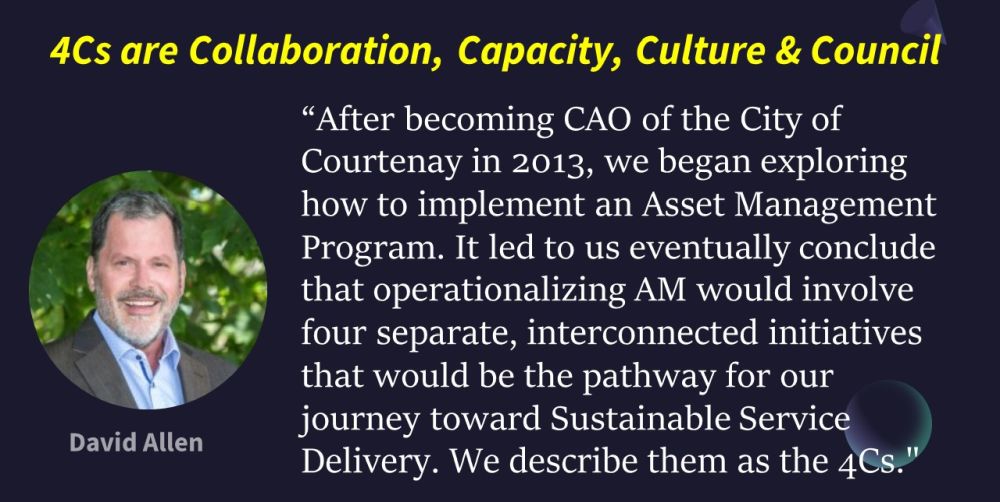
To read an article by David Allen about the 4Cs, download a copy of the Fall 2020 issue of the Asset Management BC Newsletter, and scroll down to page 3.
Theme #1 – Asset management leadership starts with the Chief Administrative Officer (CAO)
David Allen: In 2013, when I made my first presentation about asset management at a CAO forum, I observed mostly blank stares. A decade later, a majority of CAOs still have not bought in.
Wally Wells: David Allen speaks with authority when he says to the CAO community: “I was one of you and asset management for sustainable service delivery is a core part of your job as CAO. It Is not an add-on.”
David Allen: There has been a broadening and deepening of asset management knowledge. But we still need to get all CAOs on board.
Theme #2 – Asset management is a process; you cannot legislate a process
Wally Wells: People look at asset management as a function, but it is not a function. It is a process, and the process for getting you to Sustainable Service Delivery is asset management.
David Allen: Asset management is mandated in Australia. 30 years later, they are still facing many of the same challenges that we face due to a lack of leadership and integration across local government organizations.
Wally Wells: Their experience speaks to the universal problem in embedding change. You cannot legislate a process. All they have done is mandate “the plan” which is one task in the process. That does not change the culture to follow through with effective implementation and integration.

Theme #3 – Be wary of including natural assets in Public Sector Accounting Board requirements
David Allen: Nature and natural assets are now part of the mix for local government asset management. This represents a huge shift in thinking because we have always treated nature as an externality in our economic system.
The old way of thinking comes to mind when we look at what the Public Sector Accounting Board has in mind when it talks about including natural assets in PSAB 3150.
Wally Wells: David has touched on a hot button for me. I am really, really, really nervous about the way the accounting profession will try to treat natural assets in a financial statement. Accountants do not know how to deal with the subject of natural asset management. Consider this as my call to action!
David Allen: My suggestion is practical and straightforward. Just do what the Town of Gibsons did in 2014. They included an accountant’s note in the Financial Statement that refers to natural assets. That is all you need. An auditor’s note is an appropriate form of recognition and can be accompanied by reference to a separate report specific to natural assets.
What matters most is that nature is not treated as an externality by communities and local governments. Find ways to incorporate natural asset management into the day-to-day work of local governments. Do not lose sight of the goal, strive for Sustainable Service Delivery.
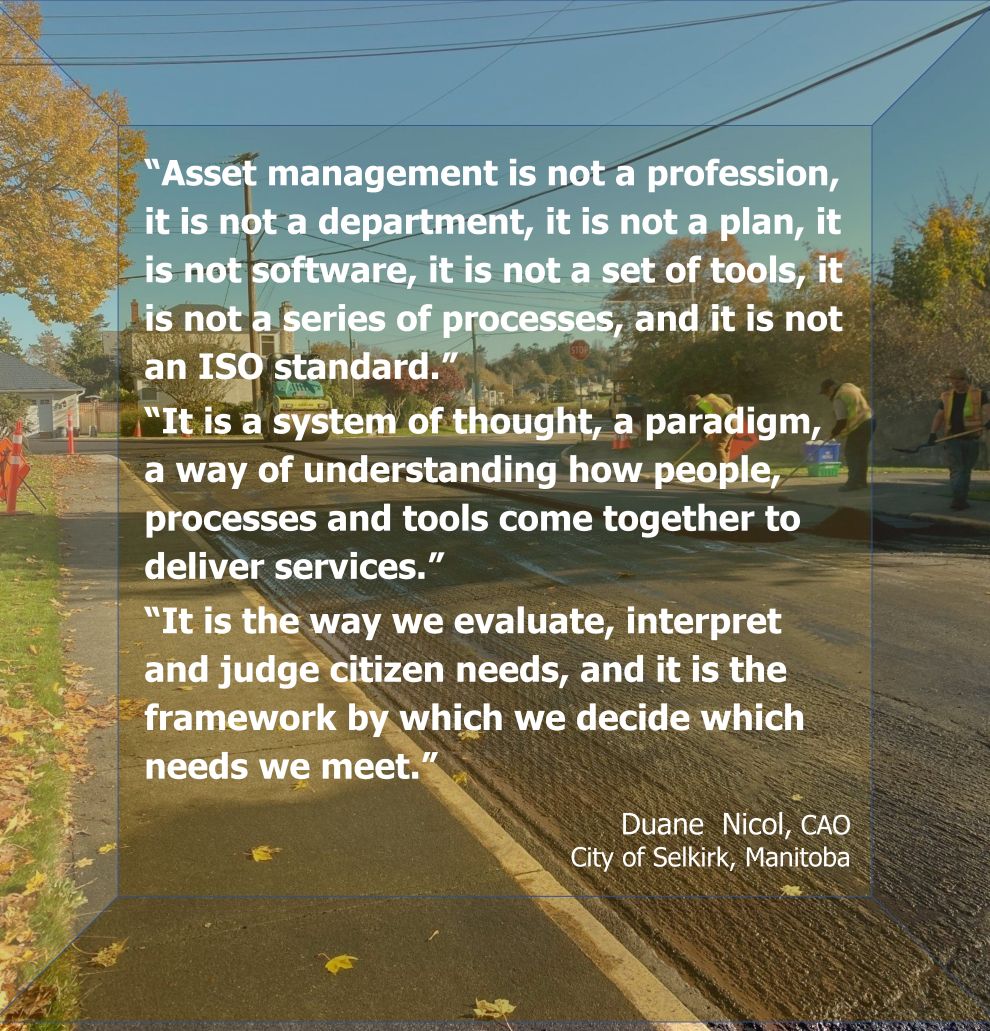
To read the article by Duane Nicol that builds on the above, download a copy of the Winter 2022 issue of the Asset Management BC Newsletter
Theme #4 – Asset management is a pathway to Water Reconciliation with First Nations
David Allen: When I think about First Nations, so much is about building relationships. You must have their trust to really effect change related to asset management in First Nations communities. Asset Management BC is making progress in building a relationship-based foundation.
Wally Wells: None of the other asset management communities-of-practice across Canada have integrated First Nations. Some talk about it. We do it in BC. That is a win for all of us.
David Allen: The next step is to build on that foundation, so training programs for First Nations communities are responsive, meaningful and relevant, and always keeping in mind that many of their communities only have a few hundred residents.

To read an article by Wally Wells titled What’s in a WORD: The word ‘Plan’, download the Winter 2022 issue of the Asset Management BC Newsletter.
Did you enjoy this article? Would you like a PDF document version? It includes an appendix which is the transcript of the conversation between Wally Wells and David Allen. Click on the image below to download your copy.
DOWNLOAD A PDF COPY: https://waterbucket.ca/wcp/wp-content/uploads/sites/6/2022/10/PWSBC_Living-Water-Smart_Asset-Management-BC_2022.pdf


